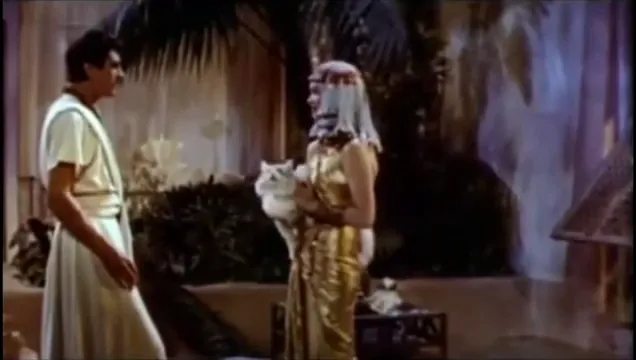🎯 Quick Overview
Trailer
- Director: Michael Curtiz
- Genre: Drama, Historical, Epic
- Release year: 1954
- Runtime (length): 2h 19min
- IMDb rating: 6.5/10 (4.7K votes)
- Rotten Tomatoes: 25%
😅 Plot Summary – Badly Explained
A physician orphan messes up his life chasing a gold-digging temptress, gets exiled, witnesses a pharaoh’s failed religious revolution, and ultimately decides life is better alone after learning some dramatic family secrets.
🍿 The Egyptian: Detailed Plot Synopsis
An Orphan’s Rise to Physician
The story begins in ancient Egypt, where an orphaned infant, Sinuhe, is found in a reed basket on the Nile. He is adopted by a kind physician and grows up in Thebes. Despite initially considering a military path, Sinuhe follows in his adoptive father’s footsteps, dedicating himself to studying medicine. Sinuhe becomes a brilliant physician and forms a strong friendship with the ambitious Horemheb. Their paths diverge and converge over the years, shaped by the turbulent events of the 18th dynasty and the shifting political landscape under a new pharaoh.

Meeting the Pharaoh and Courtly Life
During a lion hunt in the desert, Sinuhe and Horemheb encounter a mysterious man worshiping the sun and save his life. This man is revealed to be the new Pharaoh, Akhnaton, who champions a revolutionary monotheistic religion centered on the god Aten. Impressed, Akhnaton appoints Sinuhe as his personal physician and Horemheb as a military commander. Sinuhe finds himself drawn into the opulent yet politically charged world of the Pharaoh’s court. His life takes a dramatic turn when Horemheb introduces him to Nefer, a captivating but ruthless Babylonian courtesan. Infatuated, Sinuhe sacrifices everything he has for her.

Exile and Wandering
Having squandered his inheritance and neglected his duties for Nefer, Sinuhe is left destitute and disgraced when she ultimately rejects him. His loyal one-eyed servant, Kaptah, remains with him despite Sinuhe’s folly. Facing ruin in Thebes, Sinuhe becomes a marked man. Along with Kaptah, Sinuhe flees Egypt and spends many years traveling through foreign lands. During his exile, he continues to practice and hone his skills, gaining renown as a physician across the ancient world.

Return to a Troubled Egypt
When Sinuhe eventually returns to Egypt, he finds the country in turmoil. Pharaoh Akhnaton’s focus on his new religion has weakened the military and divided the populace, incurring the wrath of the powerful priests of Amon. The nation is vulnerable to outside threats, particularly the Hittites. Sinuhe observes the growing unrest and finds his old friend Horemheb now deeply involved in plotting against the idealistic but ineffective Pharaoh. He also encounters the ambitious Princess Baketamon, the Pharaoh’s sister, who harbors her own desires for power and becomes entangled in the political machinations.

⚠️ Spoilers and Ending Explained
🎬 Cast & Characters
- Sinuhe (Edmund Purdom): A skilled physician who rises to prominence in ancient Egypt but becomes disillusioned with the corruption and upheaval around him.
- Akhenaten (Michael Wilding): The idealistic Pharaoh who seeks to introduce a new, single deity but neglects the practical governance of his kingdom.
- Merrit (Jean Simmons): A kind and virtuous innkeeper’s daughter who represents true love and stability in Sinuhe’s tumultuous life.
- Horemeb (Victor Mature): Sinuhe’s ambitious and pragmatic military friend who eventually rises to power to restore order in Egypt.
- Kaptah (Peter Ustinov): Sinuhe’s cynical yet loyal servant and friend who provides comic relief and practical assistance.
- Nefer (Bella Darvi): A seductive and manipulative Babylonian courtesan who initially captivates Sinuhe and leads him into financial ruin.
💬 Memorable Quotes
- Nefer: “The greatest gift any man can bring to a woman is his innocence, which he can give only once.” – Spoken seductively to Sinuhe, tempting him into a relationship that will ultimately ruin him.
- Grave Robber: “Immortality? I hold it in my hand.” – Said philosophically while showing Sinuhe and Kaptah a handful of sand, representing the fleeting nature of life and ambition.
- Sinuhe: “There may be dwelling beyond the sunset of the world, a kingdom not of this earth.” – A reflective line spoken by Sinuhe, contemplating the possibility of a higher power or spiritual realm beyond the material world.
- Akhnaton: “On your faces! On your faces before the living God!” – A command given by the Pharaoh to introduce his new monotheistic worship of the Aten, shocking those accustomed to polytheism.
💰Box Office
- Budget: $5,000,000
- Domestic Gross: $9,500,000
- Worldwide Gross: N/A
💥 The Egyptian Reviews
Personal Review
Wow, ‘The Egyptian’ is a trip! I went into it expecting a typical old-school epic, and while it definitely has that grandeur, it surprised me with how much it focused on the main character’s personal struggles. Watching Sinuhe go from idealistic doctor to heartbroken exile was genuinely affecting. The scene where he loses everything for Nefer was just painful to watch – you feel his foolishness and the sting of betrayal. And Peter Ustinov as Kaptah? He’s absolutely brilliant, bringing humor and warmth to every scene he’s in. The visuals are stunning too, especially considering when it was made. You really feel transported to ancient Egypt. It’s a long movie and moves slowly in parts, but the character journeys and the peek into this fascinating historical period kept me hooked. Definitely recommend if you like thoughtful epics with impressive production design.
- Who would enjoy:
- “Fans of classic Hollywood historical epics and ‘sword and sandals’ films”
- “Viewers interested in ancient Egyptian settings and stories (despite historical liberties)”
- “Those who appreciate elaborate sets, costumes, and sweeping musical scores from the 1950s”
- “Fans of the cast, particularly Peter Ustinov or Victor Mature”
- “People interested in themes of fate, morality, and the search for meaning”
- Content warnings ⚠:
- “Sequences depicting palace intrigue and political maneuvering”
- “Thematic elements involving ambition, betrayal, and loss”
- “Scenes of violence related to conflict and rebellion”
- “Depiction of a courtesan and themes of seduction and ruin (typical for the era)”
Professional Reviews
- Classic Film Aficionado: “”The Egyptian” might suffer from a deliberate pace and some uneven acting, but its sheer spectacle is undeniable. The production design and CinemaScope cinematography are breathtaking, creating a vivid, ancient world. While some performances, like Ustinov’s charismatic rogue, shine brightly, others feel a bit stiff. It’s a film best appreciated for its visual and auditory grandeur, a true example of 1950s epic ambition.
- Historical Epic Enthusiast: “This adaptation of Mika Waltari’s novel takes some liberties with history, particularly concerning the succession of Akhenaton and the depiction of Horemheb. However, it succeeds in portraying the turbulent era and the psychological journey of its protagonist, Sinuhe. The film is a visual feast, boasting incredible sets and costumes that transport you to 18th Dynasty Egypt. It’s a thoughtful spectacle, even if the historical accuracy isn’t its strongest suit.
- Genre Fan Site: “As a ‘swords and sandals’ flick, ‘The Egyptian’ stands out for its more introspective take. While lacking massive battle scenes, it delves into political intrigue and religious conflict. Peter Ustinov is a scene-stealer, providing much-needed energy. The lead performance can feel a bit bland at times, but the overall scope, magnificent score by Newman and Herrmann, and lavish visuals make it a compelling watch for fans of the genre looking for something a bit different.
Audience Reactions
Peter Ustinov’s performance as Kaptah is consistently praised as a highlight.: Many viewers appreciate the film’s lavish production values, including the sets, costumes, and cinematography, especially given its age. The score by Newman and Herrmann is frequently mentioned as outstanding. While historical accuracy is debated, the attempt to depict the Akhenaton period and Egyptian culture is seen as unique and valuable.
The film’s more philosophical and character-driven approach compared to typical epics resonates with some.: Despite some criticism for slow pacing or perceived miscasting in the lead, many find the story engrossing and the character arcs compelling, particularly Sinuhe’s journey of disillusionment and self-discovery. Bella Darvi’s portrayal of Nefer is often cited as memorable, for better or worse.
Overall Consensus: A visually stunning and thought-provoking historical epic from the 1950s, praised for its production design and Peter Ustinov’s performance, though some find it slow-paced and debate its historical accuracy.
Awards
🛠️ Behind the Scenes
- “Marlon Brando was originally cast in the lead role of Sinuhe but dropped out shortly before filming began, leading to Edmund Purdom being cast.”
- “Marilyn Monroe actively campaigned for the role of Nefer, but producer Darryl F. Zanuck cast his then-mistress, Bella Darvi, in the part.”
- “Bella Darvi’s professional name was reportedly created by combining parts of Darryl Zanuck’s and his wife Virginia’s first names (Dar-vi).”
- “After production, many of the elaborate sets, props, and costumes were purchased by Paramount and reused in Cecil B. DeMille’s 1956 epic, ‘The Ten Commandments’.”
- “This was the second film produced by 20th Century Fox in the CinemaScope widescreen process.”
- “The film’s score was a unique collaboration between two renowned composers, Alfred Newman and Bernard Herrmann, who reportedly alternated composing cues for the film.”
🖥️ How to Watch The Egyptian?
As a classic film from 1954, ‘The Egyptian’ may not be readily available on subscription streaming services. Your best bet for watching this historical epic is typically through digital rental or purchase on platforms such as Amazon Prime Video, Apple TV, Google Play, or Vudu. Check these services for availability and pricing options. Libraries and specialty classic film distributors may also offer physical copies (DVD/Blu-ray) for loan or purchase.

🎥 Similar Movies
If you enjoyed The Egyptian, you might like these similar films:
- The Ten Commandments (1956): A direct comparison and contemporary epic known for its grand scale, religious themes, and depiction of ancient Egypt, sharing similar production values and scope.
- Land of the Pharaohs (1955): Another large-scale historical epic from the same era focused on ancient Egypt, exploring themes of power, ambition, and large construction projects.
- Spartacus (1960): A renowned historical epic from the same period featuring large sets, a focus on societal structures, and a notable performance by Peter Ustinov, similar to his role in ‘The Egyptian’.
- Gladiator (2000): A modern equivalent that revived the historical epic genre, featuring grand spectacle, personal drama against a large historical backdrop, and themes of power, betrayal, and morality.
- Faraon (1966): A Polish film adaptation of a similar historical novel about an Egyptian pharaoh, known for its visual authenticity and political/religious themes, appealing to fans of ‘The Egyptian’ seeking a different perspective.
🛒 The Egyptian Related Products
- The Egyptian (Mika Waltari Novel): Read the critically acclaimed historical fiction novel that inspired the film. Dive deeper into Sinuhe’s life, travels, and philosophical journey.
- Ancient Egypt: History and Archaeology Documentary Collection: Explore the real history and culture of ancient Egypt with a collection of documentaries from leading historians and archaeologists.
- Egyptian Ankh Necklace: A replica or inspired-by piece of jewelry featuring the Ankh, the ancient Egyptian symbol for ‘life’, which holds thematic significance in the film.
- Classic Hollywood Epic Films Blu-ray Collection: A box set featuring restored versions of major historical epics from the 1950s and 60s, showcasing the grandeur of the era.
🎧 Soundtrack
The Egyptian features a captivating soundtrack that enhances the movie’s atmosphere and emotional impact. Here are some notable tracks:
You can find the complete soundtrack on Amazon Music and Apple Music.
🤨 FAQ
While ‘The Egyptian’ is based on Mika Waltari’s novel, which drew inspiration from ancient texts and history, the film takes significant liberties with historical accuracy for dramatic purposes. Key inaccuracies include the timeline of Pharaoh Akhenaten’s reign, the events surrounding his death, and the succession to the throne, which bypasses Tutankhamun.
Yes, ‘The Egyptian’ (1954) is based on the internationally bestselling 1945 novel of the same name by Finnish author Mika Waltari. The film adapts the story of Sinuhe, focusing on his life and experiences in ancient Egypt.
The lead role of Sinuhe the Egyptian in the 1954 film was played by British actor Edmund Purdom. He took over the role after Marlon Brando famously dropped out of the production.
Pharaoh Akhenaten (played by Michael Wilding) is depicted as a revolutionary leader attempting to introduce a monotheistic religion centered on the sun god Aten, challenging the powerful priests of Amon. His philosophical and peaceful approach contrasts sharply with the political ambitions of others, serving as a catalyst for much of the film’s conflict and reflecting themes of faith versus power.
‘The Egyptian’ features a notable score composed by two legendary film composers, Alfred Newman and Bernard Herrmann. They worked collaboratively, alternating cues, to create the film’s epic and distinctive musical landscape.
🔥 Bonus Content
What Ancient Egyptian Sounded Like – and how we know
Ever wonder what the characters in ‘The Egyptian’ might have actually sounded like? This video does a fantastic job explaining how experts reconstruct the language of ancient Egypt – it’s seriously cool stuff!
Ancient Egyptian Music – Pharaoh Ramses II
Beyond the epic score of ‘The Egyptian’, what kind of music echoed through the real ancient land? This video gives you a taste of music inspired by that incredible era!
Ancient Egyptian Cats 🐱 #comedy #cat #shorts
Did you know cats were kind of a big deal in ancient Egypt? Get a quick, funny peek into their world with this short clip – it’s a fun historical aside!
✨ Rate
There are no reviews yet. Be the first one to write one.





